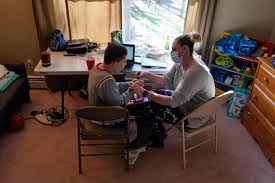Pandemic’s Impact on People with Disabilities
Physically and intellectually disabled face disruption and change amidst COVID-19 battle.

Jessica Wein aids Josh Nazzaro in attending virtual classes, where he struggles to keep focus. (Seth Wenig)
The pandemic has presented many obstacles to people’s everyday lives, including a quiet but extensive impact on those who suffer from intellectual and developmental disabilities. An already vulnerable population has lost access to their support systems – caregivers, service providers, and teachers – which they rely on to carry out their normal lives.
The rapid spreading of the COVID-19 virus has ushered a worldwide reliance on technology. Throughout this quick transition, the arrangements for those with special needs were mostly overlooked. Tiffany Anderson, a blind student attending Johnston Community College, has struggled with the digital textbook not offering a format compatible to her screen reader, where her assignments proceed.
“It’s stressful, because you feel like you’re falling behind,” Anderson says.
Cyndi Wiley, digital accessibility coordinator at Iowa State, hopes for a world where accommodations are readily available for all students, not just those who have requested it.
“I would love to live in a world where we didn’t have to make accommodations because all our materials are just accessible,” Wiley says.
Experts stress that in-person instruction is vital not only to the disabled, but also to their families supporting them. John Constantino, the co-director of the Intellectual and Developmental Disabilities Research Center at Washington University School of Medicine, shares the daily difficulties faced without the structure of a regular school day.
“Although there is public awareness of some of the challenges imposed by the pandemic on individuals with disabilities, the totality of the impact on a family or a person with such disabilities can go unrecognized, even by professionals,” Constantino says.
The pandemic’s many changes can cause disorientation in those with disabilities. Popova, who works in the pediatric occupational therapy facility at Rush, urges compassion.
“They may perceive the significant changes around them, such as social distancing or quarantine, as their fault or a result of something they did. They may even fear seeing people wearing face masks,” Popova says.
The perspective of those with disabilities is hard to understand unless you’ve experienced it yourself. Marion Quirici, a disability studies professor at Duke University, believes the inequities faced daily by those with disabilities have been amplified throughout the pandemic.
“There is a lesson to learn from people with disabilities who are coming forward as leaders during this transition and speaking about inequities that persist in higher education,” Quirici says.

